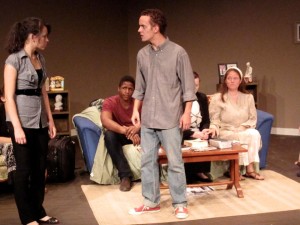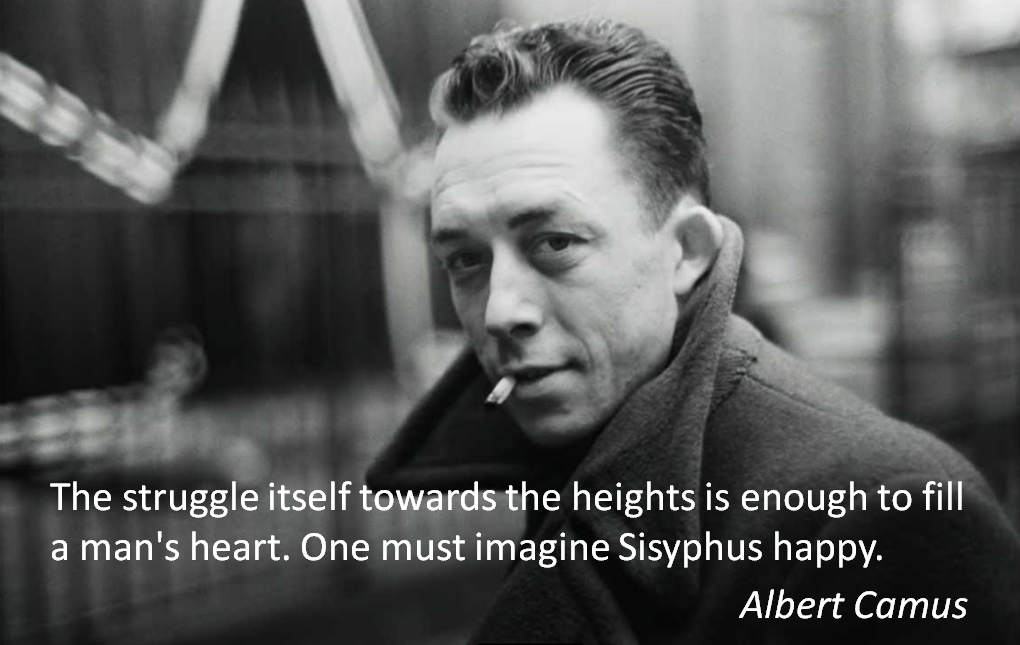Today’s post from The Slow Hunch was written on the 10th anniversary of 9/11. I’m a little late (it is after 11pm in Texas), but I still technically made it. Just a few thoughts on hope and redemption on a day that can sometimes convince us there is none.
Religion
A Game Theoretic View of the Atonement
 Want to know one way to guarantee no comments on Times And Seasons? I decided to try “use lots of game theory” and see how that works. So far? Success. But if you think seeing the world as one giant, iterated Prisoner’s Dilemma sounds interesting, then maybe you should give it a read anyway.
Want to know one way to guarantee no comments on Times And Seasons? I decided to try “use lots of game theory” and see how that works. So far? Success. But if you think seeing the world as one giant, iterated Prisoner’s Dilemma sounds interesting, then maybe you should give it a read anyway.
I know I had fun writing it, and if I ever had the time, I’d love to actually formalize the model and try it out. Shifting from traditional economic models to complex systems was a major interest for me when I was studying at Michigan, and it would be great to scratch that itch again.
What is “unscientific”?
I recently had a discussion with an individual about the supposed incompatibility of religion and science. This individual was convinced that most of the central claims of any religion can be labeled as unscientific. I disagreed, but not simply because of my own convictions about the nature of God, but also because of my intuition about the limitations of science and why any questions or claims that lay beyond those limitations are not automatically “unscientific.”
I’d like to start by making reference to a related argument. In the very public, recent intelligent design vs science court case Kitzmiller v. Dover Area School District, celebrated intelligent design proponent Dr. Michael Behe was forced to admit that his argument–that can be effectively summarized as follows:
the input of an intelligent designer is the only currently-known method for producing the strong appearance of design (theoretical arguments of evolutionists notwithstanding) that we find in complex biological organisms, and therefore the inference of a designer is rationally justified
is an inductive argument that can never be ruled out (is unfalsifiable). This “marginalization by unfalsifiability” was how Behe’s arguments were painted as “unscientific” and therefore unworthy of serious consideration. Falsifiability is how Karl Popper famously gave science an escape from Hume’s problem of induction. Falsifiability allows us to say that since it’s so difficult, if not impossible, to prove a claim absolutely true, we instead seek to prove it false, which is a far easier task. If your predictions cannot be shown to be false, they are generally considered to be unscientific. This is, of course, a rough and somewhat naive explanation of how science is done as scientists are more concerned with supporting or contradicting evidence surrounding a claim, but falsifiability is nonetheless a fairly reliable gauge of whether or not a specific claim can ever be considered “scientific.”
If these are the grounds on which we may rule out certain inductive arguments in terms of their “scientificity,” then I would like to suggest that, from a philosophical standpoint, we can similarly dismiss many more supposedly scientific arguments. As an illustration, let’s consider the varying and even competing hypotheses of abiogenesis–the natural process by which life arises from simple organic compounds, implicitly without the need of any intelligent input. That this process occurred at some point in earth’s history is, of course, the default position of most scientists. Any claims to the contrary simply remove the origins of life elsewhere in the universe without actually answering the central question. Scientists believe that either life can create itself from naturally occurring materials, or we lose all explanatory power about the origins of life since the input of an intelligent creator would necessitate an explanation of how that creator itself came to be.
Let’s examine both possibilities a bit more closely. How could we test that life arises from naturally occurring, simple compounds? We could formulate an experiment or series of experiments in which we mix such compounds under simulated pre-life earth conditions and see if such a process can produce a self-replicating molecule. If our experiments produce such a molecule, we have indeed confirmed that life can arise spontaneously from naturally occurring, simple organic compounds. Does this prove that life arose on earth in a like manner?
Well, no. It can, at best, only strengthen the claim that life arose on its own on earth. And in fact, since we can’t know the exact conditions under which life arose on earth, our test itself required the input of an intelligence to both create the test and then fine-tune its parameters. This forces us to explain the success of our experiment, which strengthens the claim we’ve made about the natural origin of life on earth, in terms of the actions of that life. What then to make of the explanatory power of abiogenesis?
What about our other theory–that life arose on earth with help? Attributing the origin of life on earth to a creator intelligence could require the exact same test–and in fact the same experiment we used to verify our predictions about the capabilities of natural abiogenesis could be used equally well to strengthen the claim of intelligent biogenesis. Where does that leave us?
Are any of the specific claims that follow from or precede our experiments falsifiable? Probably not, at least not without a time machine. Are they then unscientific? No. One of the biggest problems I have with reductionism is the ironically religious-like a priori rejection of claims without considering their merit and without serious introspection and a healthy sense of skepticism toward one’s own convictions.
The universe is a strange place, and I believe we will find it to be far stranger the more we learn about it. If a claim must fit our personal worldview, let’s at least allow others, especially those with whom we disagree, the same consideration. We might learn something.
Monday Morning Mormon Madness: The Abyss of Everything and Nothing
My latest piece at Times And Seasons is an rebuttal to the argument-as-explanation that religion is fundamentally an exercise in death-denial, and also a more personal piece of writing than my usual. I hope you find it interesting.
Orson Scott Card and His Imitation of Fox News: Paranoia? Hyperbole? Satire?
 After reading novelist and political commentator Orson Scott Card’s bizarre “thought experiment,” titled “Unlikely Events,” I really am quite mystified. In the article he plays a “game” in which he imagines President Obama becoming a fascist overlord ruling with an iron fist over America and being a figure akin to Hitler. Although he tries to reassure his readers that, of course, he doesn’t believe this stuff, and that he’s just wearing his hat as a “fiction” writer, yet he still also insists that “it sure sounds plausible, doesn’t it? Because, like a good fiction writer, I made sure this scenario fit the facts we already have — the way Obama already acts, the way his supporters act, and the way dictators have come to power in republics in the past.” He says that “the writer’s made-up characters and events must seem truthful. We must pass the plausibility test.”
After reading novelist and political commentator Orson Scott Card’s bizarre “thought experiment,” titled “Unlikely Events,” I really am quite mystified. In the article he plays a “game” in which he imagines President Obama becoming a fascist overlord ruling with an iron fist over America and being a figure akin to Hitler. Although he tries to reassure his readers that, of course, he doesn’t believe this stuff, and that he’s just wearing his hat as a “fiction” writer, yet he still also insists that “it sure sounds plausible, doesn’t it? Because, like a good fiction writer, I made sure this scenario fit the facts we already have — the way Obama already acts, the way his supporters act, and the way dictators have come to power in republics in the past.” He says that “the writer’s made-up characters and events must seem truthful. We must pass the plausibility test.”
But then Card shovels in comparisons to Hitler and every other dictator he can think of. When people start comparing their ideological rivals to Hitler, they have shown their refusal to speak with nuance and distinction. They have immediately lost the argument, in my mind. He then throws in a huge number of broad generalizations and hyperbolic statements such as this:
Obama is, by character and preference, a dictator. He hates the very idea of compromise; he demonizes his critics and despises even his own toadies in the liberal press. He circumvented Congress as soon as he got into office by appointing “czars” who didn’t need Senate approval. His own party hasn’t passed a budget ever in the Senate.
In other words, Obama already acts as if the Constitution were just for show. Like Augustus, he pretends to govern within its framework, but in fact he treats it with contempt.
Mormons…the new Jew?: Exploring the Jewish-Mormon Connection

Rabbi Perry Tirschwell wrote an interesting comparison of Mormons and Jews in the Jewish Press yesterday. Ever since Orson Hyde dedicated the Holy Land and prophesied about the Zionist movement, Mormons have had a vested interest in witnessing the restoration of the Jews’ place in the world. It should be clear, though, that Latter-day Saint Church leaders are on record in expressing love for towards both Jews and Muslims, lest people think we’re taking a side in certain Middle-East conflict. The late Mormon president/prophet Howard W. Hunter said in his excellent 1979 address “All Are Alike Unto God”:
Monday Morning Mormon Madness: We Are All the Work of Thy Hand
I missed last Monday due to scheduling snafu’s at Times & Seasons, but I’m back in my current Monday slot this morning with a piece about accepting growth and, by implication, accepting that growth takes time.
The Virtuous Atheist or Atheist Maligned: Atheism Comforted and Confronted in my Religious Plays, Part One

WARNING: Spoilers ahoy! If you want the context of the play referenced, A Roof Overhead, the majority of the production by ASU’s Binary Theatre Company was recorded and is up on You Tube. It’s not the highest quality recording, and it was a matinee (thus, historically, less audience engagement and laughing), but you get a good sense of that particular production. The Utah production, unfortunately, was not recorded due to technical difficulties (so not even I got to see it!). Of course, I think the issues the essay raises go beyond the actual play, so feel free to read it if you haven’t the time to watch an entire play at the moment.
James Goldberg’s award winning one act play “Prodigal Son” is a stirring play that flips Jesus’ proverb of the same name, showing the relationship between a former Mormon turned atheist and his son Daniel, who joins the faith his father had long since rejected. The tension and conflict caused by the reversal of the parental disapproval is both ironic and effective. Set in this gem of a play is a haunting monologue addressed to the audience by Daniel’s father:
We’re far too casual, I think, in the way we talk about losing. “I’ve lost my keys,” for example, really means you’ve mislaid them. We say we’re “lost” when we’re just disoriented. And we lose our tempers all the time, only to find them again a few minutes later—
I wish we wouldn’t dilute the best word we have for when things are truly and permanently gone. “Lost cause” is a good phrase. It’s a cold, hard dose of reality. No one goes out to find a lost cause. It’s just lost. That phrase understands the power of the word’s finality…
So when I tell you that a long time ago I lost my faith, I don’t want you imagine that I’ve misplaced or that I could be capable of finding it again. Lost faith is like a lost limb…if it’s broken and bleeding, if you try to patch it up and ends up being inflamed and infected…at some point you have to cut it off. And after you’ve lost it the only thing left is the occasional flash of phantom pain.
I lost my faith. Twenty years later I lost my wife. And now maybe I’m losing my son.
Don’t take away from me the only word I have to cope with that.[1]
Coming from a practicing Mormon like Goldberg, the monologue is unusually and beautifully sensitive towards this fictional father’s disbelief in God and religion. It shows a well of compassion and charity on Goldberg’s part towards what really amounts to a religious minority (at least in the United States and other predominately religious countries, although that trend is fast reversing in many places in the world). It’s an unexpectedly poignant moment in a beautiful play.
In this way, Goldberg has shown that he is particularly ready to clarify the way of the atheist to believers, and pleas for understanding on the his atheist friends behalf—perhaps even to the point of being a warm ambassador or a defensive patron when discussing atheism among believers. Thus it makes sense that, in his review of my play A Roof Overhead, he was quick to come to the defense of the doubter, even though such a vigorous and heated defense was hardly needed considering the context of the play’s intended message of tolerance and pleas for mutual understanding.
As Goldberg is not the only critic to misrepresent my representation of atheism, including a handful of antagonistic reviews written against my plays Swallow the Sun and Prometheus Unbound, I feel compelled to address the issue directly. I normally like my plays to stand on their own artistically, so that people may interact with them based on their own experiences and what they personally bring to the play, without constant and intrusive commentary from me.
However, some have tried to tie me to a pattern of intolerance towards atheists, even resorting to rather personal slights and warnings to others against my work. Thus, in the name of my reputation, I feel it best to clear up what my intent is, and what my intent decidedly isn’t, towards atheism and atheists. After all, if I’m to be lambasted on the matter, I would prefer to be lambasted for something I actually believe.
Ms. Molly Goes to Hollywood: Mormon Women Authors and Filmmakers Represent with “Austenland”
My monthly post at the Association for Mormon Letters’ blog Dawning of a Brighter Day just went up. This month I explore the interesting possibilities that have opened up with the Mormon female helmed release of the film Austenland in my post “Ms. Molly Goes to Hollywood: Mormon Women Authors and Filmmakers Represent with Austenland.” Check it out by clicking on the link!

Jonathan Langford on the God Who Weeps
 Jonathan Langford over at A Motley Vision gave an insightful review of Terryl and Fiona Givens’ The God Who Weeps, perhaps the best book I read this past year (and which quickly leapt up to my all-time favorites list). Check it out by clicking here.
Jonathan Langford over at A Motley Vision gave an insightful review of Terryl and Fiona Givens’ The God Who Weeps, perhaps the best book I read this past year (and which quickly leapt up to my all-time favorites list). Check it out by clicking here.
Also, if you’re interested in my own approach to, and appreciation for, the Givenses and their work in the past, here are my thoughts on Terryl Givens in Terryl Givens: The Mormon C.S. Lewis and my interview with Fiona Givens, Nothing Can Separate Us From the Love of God.
And, yes, Difficult Run’s Nathaniel Givens is the son of these two stellar people, which makes me wonder how a single family can deal with so much awesomeness!



